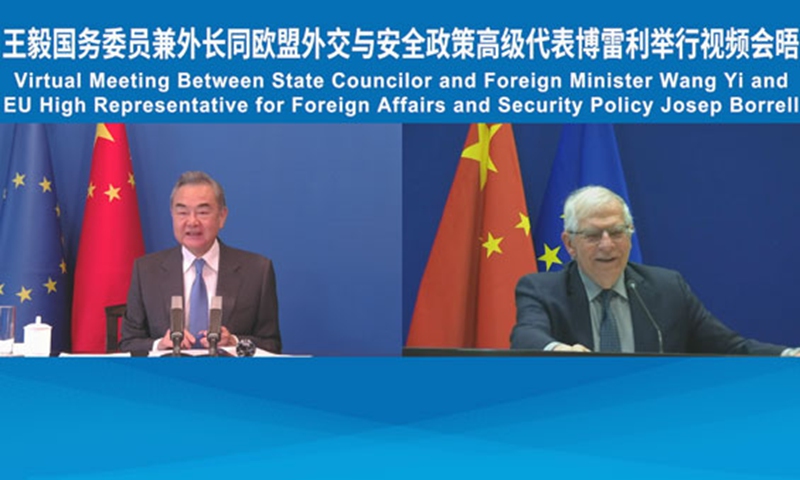
Photo: fmprc.gov.cn
The Cold War mentality and bloc-led confrontation does not work in Europe, and exerting the extreme sanctions only leads to the parties hurting each other, making the situation more complicated and further instigating the conflict, Chinese State Councilor and Foreign Minister Wang Yi said in a latest video conference with EU High Representative for Foreign Affairs and Security Policy Josep Borrell.
The video call was held ahead of EU-China summit scheduled for April 1 to discuss trade and geopolitical issues. The Ukraine crisis is expected to be one of the main issues at the summit.
Wang said China "deeply regrets that the Ukraine military conflict is still ongoing" and reiterated China's commitment for "a door to peace," according to a statement published on the website of the Chinese Foreign Ministry late Tuesday night. We have always judged the situation and decided policies based on the merits of the issue itself, and have been working in our own way to cool the situation and achieve peace at an early date, Wang said.
The latest round of Russia-Ukraine talks, held in Istanbul on Tuesday, have seen "progress," as the Russian delegation said Russia has decided to reduce military activities near Kiev and that they have received Ukraine's proposal to become "neutral," though observers said the most difficult part of the talks is the sovereignty issue and the two sides are still far off from a ceasefire.
Wang reiterated that China's position is crystal clear. "On the issue of war and peace, we stand on the side of peace. Between unilateral sanctions and dialogue and negotiation, we stand on the side of dialogue. We would like to see the situation cool down rather than escalate. Time will prove that China's position is responsible and will stand the test of history,'' he told Borrell.
The facts showed that the Cold War mentality and camp-led confrontation haven't worked out in Europe, and the practices of choosing sides and dividing the world is even less desirable.
US President Joe Biden wrapped up his visit to Europe during the weekend and he engaged in intensive diplomatic events focusing on the Ukraine crisis. The US has been motivating the enhancement of sanctions on Russia, striving to prevent his European allies from falling back on this issue.
The extreme sanctions will only lead to mutual harm, make the situation more complicated and the contradiction more intensified, Wang said at the video conference, noting it is neither fair nor legal to allow countries and people that are not involved to pay for the conflict.
Borrell further introduced EU's position and said that the EU does not seek to change Russia's political system, does not want to see the situation escalate, and opposes any form of new Cold War and camp confrontation, according to the statement.
Over the past year, there have been growing challenges in China-EU relations, especially after the China-EU Comprehensive Agreement on Investment was stalled by the unilateral freeze taken by the European Parliament last May and some anti-China MEPs visiting the island of Taiwan was also considered as serving the interests of the US.
Currently EU-China relations are facing some specific issues, but the EU is still committed to improving and upgrading bilateral relations, Borrell told Wang, noting he would like to reiterate that the EU adheres to the one-China principle, and the EU as a whole and all member states will not and should not deviate from this position.

